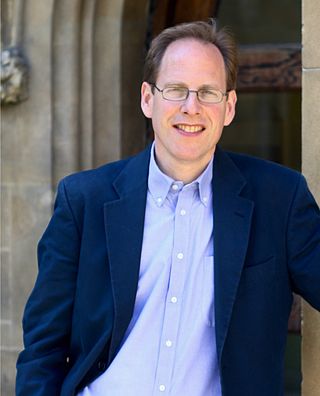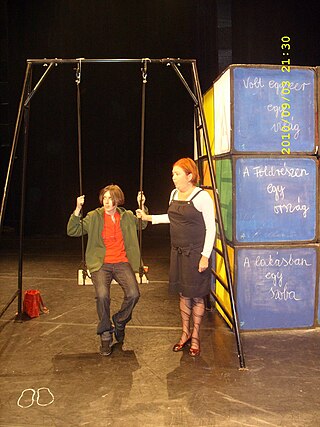Related Research Articles

Mary Temple Grandin is an American academic and animal behaviorist. She is a prominent proponent of the humane treatment of livestock for slaughter and the author of more than 60 scientific papers on animal behavior. Grandin is a consultant to the livestock industry, where she offers advice on animal behavior, and is also an autism spokesperson.

Sir Simon Philip Baron-Cohen is a British clinical psychologist and professor of developmental psychopathology at the University of Cambridge. He is the director of the university's Autism Research Centre and a Fellow of Trinity College.

Neurodiversity is a framework for understanding human brain function that recognizes the diversity within sensory processing, motor abilities, social comfort, cognition, and focus as neurobiological differences. The neurodiversity paradigm argues that diversity in human cognition is normal and that some conditions generally classified as disorders, such as autism, are differences and disabilities that are not necessarily pathological.

The autism rights movement, also known as the autistic acceptance movement, is a social movement allied with disability rights that emphasizes a neurodiversity paradigm, viewing autism as a disability with variations in the human brain rather than as a disease to be cured. The movement advocates for several goals, including greater acceptance of autistic traits and behaviors; reforms of services – i.e. services that focus on improving quality of life and well-being instead of suppression and masking of autistic traits that are adaptive or not harmful or imitations of social behaviors of allistic (non-autistic) peers ; the creation of social networks and events that allow autistic people to socialize on their own terms; and the recognition of the autistic community as a minority group.
Ole Ivar Løvaas was a Norwegian-American clinical psychologist and professor at the University of California, Los Angeles. He is most well known for his research on what is now called applied behavior analysis (ABA) to teach autistic children through prompts, modeling, and positive reinforcement. The therapy is also noted for its use of aversives (punishment) to reduce undesired behavior.

Henriett Seth F., also known by the Hungarian pseudonym Seth F. Henriett, is a Hungarian autistic savant poet, writer, musician, and artist.
Arthur Krigsman is a pediatrician and gastroenterologist best known for his controversial research in which he attempted to prove that the MMR vaccine caused diseases, especially autism. He specializes in the evaluation and treatment of gastrointestinal pathology in children with autism spectrum disorders, and has written in support of the diagnosis he calls autistic enterocolitis. The original study that tied the MMR vaccine to autism and GI complaints conducted by one of Krigsman's associates has been found to be fraudulent, and the diagnosis of "autistic enterocolitis" has not been accepted by the medical community.

Many causes of autism, including environmental and genetic factors, have been recognized or proposed, but understanding of the theory of causation of autism is incomplete. Attempts have been made to incorporate the known genetic and environmental causes into a comprehensive causative framework. ASD is a neurodevelopmental disorder marked by impairments in communicative ability and social interaction, as well as restricted and repetitive behaviors, interests, or activities not suitable for the individual's developmental stage. The severity of symptoms and functional impairment vary between individuals.
Boyd Eugene Haley is an American anti-vaccine activist and retired professor of chemistry at the University of Kentucky.
The empathising–systemising (E–S) theory is a controversial theory on the psychological basis of autism and male–female neurological differences originally put forward by English clinical psychologist Simon Baron-Cohen. It classifies individuals based on abilities in empathic thinking (E) and systematic thinking (S). It measures skills using an Empathy Quotient (EQ) and Systemising Quotient (SQ) and attempts to explain the social and communication symptoms in autism spectrum disorders as deficits and delays in empathy combined with intact or superior systemising.

Societal and cultural aspects of autism or sociology of autism come into play with recognition of autism, approaches to its support services and therapies, and how autism affects the definition of personhood. The autistic community is divided primarily into two camps; the autism rights movement and the pathology paradigm. The pathology paradigm advocates for supporting research into therapies, treatments, and/or a cure to help minimize or remove autistic traits, seeing treatment as vital to help individuals with autism, while the neurodiversity movement believes autism should be seen as a different way of being and advocates against a cure and interventions that focus on normalization, seeing it as trying to exterminate autistic people and their individuality. Both are controversial in autism communities and advocacy which has led to significant infighting between these two camps. While the dominant paradigm is the pathology paradigm and is followed largely by autism research and scientific communities, the neurodiversity movement is highly popular among most autistic people, within autism advocacy, autism rights organizations, and related neurodiversity approaches have been rapidly growing and applied in the autism research field in the last few years.
Mark Robin Geier is an American former physician and controversial professional witness who testified in more than 90 cases regarding allegations of injury or illness caused by vaccines. Since 2011, Geier's medical license has been suspended or revoked in every state in which he was licensed over concerns about his autism treatments and his misrepresentation of his credentials to the Maryland Board of Health, where he falsely claimed to be a board-certified geneticist and epidemiologist.
The Autistic Self Advocacy Network (ASAN) is an American 501(c)(3) nonprofit advocacy organization run by and for individuals on the autism spectrum. ASAN advocates for the inclusion of autistic people in decisions that affect them, including: legislation, depiction in the media, and disability services.

Autism Speaks Inc. is an American non-profit autism awareness organization and the largest autism research organization in the United States. It sponsors autism research and conducts awareness and outreach activities aimed at families, governments, and the public. It was founded in February 2005 by Bob Wright and his wife Suzanne, a year after their grandson Christian was diagnosed with autism. The same year as its founding, the organization merged with Autism Coalition for Research and Education. It then merged with the National Alliance for Autism Research in 2006 and Cure Autism Now in 2007.

Ari Daniel Ne'eman is an American disability rights activist and researcher who co-founded the Autistic Self Advocacy Network in 2006. On December 16, 2009, President Barack Obama announced that Ne'eman would be appointed to the National Council on Disability. After an anonymous hold was lifted, Ne'eman was unanimously confirmed by the United States Senate to serve on the Council on June 22, 2010. He chaired the council's Policy & Program Evaluation Committee making him the first autistic person to serve on the council. In 2015, Ne'eman left the National Council on Disability at the end of his second term. He currently serves as a consultant to the American Civil Liberties Union. As of 2019, he also is a Ph.D. candidate in Health Policy at Harvard University.
Autism, also called autism spectrum disorder (ASD) or autism spectrum condition (ASC), is a neurodevelopmental disorder characterized by symptoms of deficient reciprocal social communication and the presence of restricted, repetitive, and inflexible patterns of behavior that are impairing in multiple contexts, excessive or atypical, or developmentally and socioculturally inappropriate. Other common signs include difficulty with social interaction, verbal and nonverbal communication, along with perseverative interests, stereotypic body movements, rigid routines, and hyper- or hyporeactivity to sensory input. Autism is clinically regarded as a spectrum disorder, meaning that it can manifest very differently in each person. For example, some are nonspeaking, while others have proficient spoken language. Because of this, there is wide variation in the support needs of people across the autism spectrum.

The imprinted brain hypothesis is an unsubstantiated hypothesis in evolutionary psychology regarding the causes of autism spectrum and schizophrenia spectrum disorders, first presented by Bernard Crespi and Christopher Badcock in 2008. It claims that certain autistic and schizotypal traits are opposites, and that this implies the etiology of the two conditions must be at odds.
Nagwa Abdel Meguid is an Egyptian geneticist and 2002 winner of the L’Oreal UNESCO Award for Women in Science for Africa and the Middle East. Her research has "identified several genetic mutations that cause common syndromes such as the fragile X syndrome and Autism".
Sex and gender differences in autism exist regarding prevalence, presentation, and diagnosis.
The Interagency Autism Coordinating Committee (IACC) is a United States federal advisory panel within the Department of Health and Human Services (HHS). It coordinates all efforts within HHS concerning autism spectrum disorder (ASD).
References
- ↑ "Valerie Hu". George Washington University. Retrieved 5 November 2013.
- ↑ "Faculty Directory: Valerie Hu". School of Medicine and Health Sciences. George Washington University. Archived from the original on May 11, 2013.
- ↑ Hu, Valerie (22 April 2010). "Beyond Genetics". Autism Speaks blog. Archived from the original on 25 April 2010. Retrieved 29 October 2013.
- ↑ Hamel, Brant (December 2011). "A genomics approach toward understanding autism". National Institute of Environmental Health Sciences . Retrieved 29 October 2013.
- ↑ Hu, V. W.; Addington, A.; Hyman, A. (2011). Kashanchi, Fatah (ed.). "Novel Autism Subtype-Dependent Genetic Variants Are Revealed by Quantitative Trait and Subphenotype Association Analyses of Published GWAS Data". PLOS ONE. 6 (4): e19067. Bibcode:2011PLoSO...619067H. doi: 10.1371/journal.pone.0019067 . PMC 3083416 . PMID 21556359.
- ↑ Shumaker, Laura (12 April 2010). "A blood test for autism? A drug to reverse it??". SFGate . Retrieved 29 October 2013.
- ↑ "Study: Autism may be amenable to treatment". United Press International . 15 April 2010. Retrieved 9 November 2013.
- ↑ "Autism effects may be reversible". The Times of India . 10 May 2010. Archived from the original on 30 May 2013. Retrieved 10 November 2013.
- ↑ Anderson, Lisa (2013). "Researcher Discovers New Regulatory Autism Gene". Neuroscience Research. BTNRC. Archived from the original on 4 March 2016. Retrieved 30 October 2013.
- ↑ Jabr, Ferris (17 February 2011). "Faulty testosterone cycle may explain male autism bias". New Scientist . Retrieved 2 November 2013.
- ↑ Weaver, Janelle (19 July 2011). "Why Autism Strikes More Boys Than Girls". Scientific American . 22 (3): 11. doi:10.1038/scientificamericanmind0711-11b . Retrieved 6 November 2013.
- ↑ Rowan, Karen (18 February 2011). "Testosterone may bump autism rates in males". NBC News . Archived from the original on February 21, 2014. Retrieved 5 February 2014.